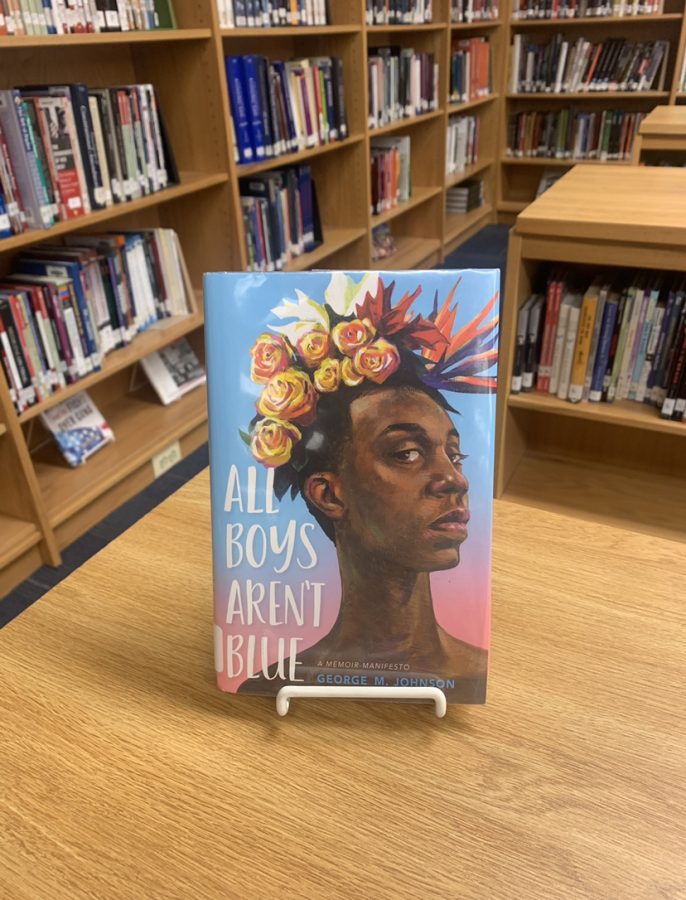Book banning: a slippery slope straight to censorship
“All Boys Aren’t Blue” by George M. Johnson was the second most banned book of the 2021-2022 school year with 29 bans. Luckily, WCHS students have access to it at the media center.
May 20, 2023
From coming-of-age comics to biographies on the civil rights movement, the WCHS media center has it all. It’s so simple: go to the library, scan the shelves, and check out a book that piques your interest. However, it’s not that effortless for everyone. Not all students have the same freedom to read what they want to read because books all across the country are being ripped off bookshelves in an attempt to “protect” children.
Last month, third-grade parents from Damascus Elementary School became upset when they found out that an LGBTQ-inclusive book named “Uncle Bobby’s Wedding” was being read in classrooms. Some parents responded by removing their kids from class. According to PEN America, from July 2021 to June 2022, a staggering 2,532 books were banned across 138 school districts in 32 states, with the majority of these books featuring characters of color or LGBTQ+ themes.
It is obvious that some books are inappropriate for certain ages; graphic violence, sexually explicit content, and offensive language may be unsuitable depending on the age group. However, is it appropriate to ban books for simply making people uncomfortable? Books should not be banned in high schools, and books featuring LGBTQ+ themes and minority characters should not be censored in elementary and middle schools.
The banned books would have offered students a window into alternative perspectives on life. In the real world, issues such as racism and homophobia are all too common. Although these topics might be uncomfortable to learn about, educating students on them is essential to building a future generation that knows how to recognize and speak out against injustice.
Not only book an excellent medium for teaching lessons on tolerance and diversity, but they are also a fundamental right. The First Amendment protects individuals and society from government attempts to censor books and suppress ideas. Although schools may be under different regulations, students still have the right to receive and access information.
If anything, the activity of removing books in schools has spun itself into a political movement based more on progressing religious and conservative agendas than putting students first. Groups at the local, state, and national levels work to file criminal complaints against school officials, using language such as “grooming” to describe books about LGBTQ+ themes. Organizations like Moms for Liberty argue that banning books is necessary in the name of parental rights over their children’s education. Yet, banning books actually gives parents less jurisdiction over what is taught in the classroom because their kids will no longer have the ability to learn about new ideas. Instead of banning books, these books should be used to start open conversations and stimulate questions.
Some insist that students can seek out banned books in public libraries or bookstores. However, not all students have this privilege. Another “middle ground” that parents argue for is that the county should alert parents when books on gender identity and sexual orientation are read. MCPS announced they will not alert parents of lessons, nor can parents opt their children out of any type of teaching.
This is an extreme point of contention in elementary schools. On the one hand, parents feel they have the right to control the books their children read. More importantly, students need to learn about the diversity of different identities, just as they learn about different religions and cultures. LGBTQ+ inclusive books like “Uncle Bobby’s Wedding” teach students to respect one another and should not be subject to an “opt-out” lesson.
The best thing a WCHS student can do to protest the banning of books is easy: read one! A few of the most banned books of the 2021-2022 school year were “Gender Queer: A Memoir” by Maia Kobabe, “The Bluest Eye” by Toni Morrison, “The Hate U Give” by Angie Thomas, and “All Boys Aren’t Blue” By George M. Johnson.
As students living in such a progressive county as Montgomery County, it can be easy to forget that other high schoolers across the country aren’t so represented in the books that compose our media centers. If you find a library, institution, or school that is trying to ban a book, make sure to report it to the American Library Association website. By staying aware of our freedoms and bringing a spotlight to taboo books, we can ensure that books stay free.


